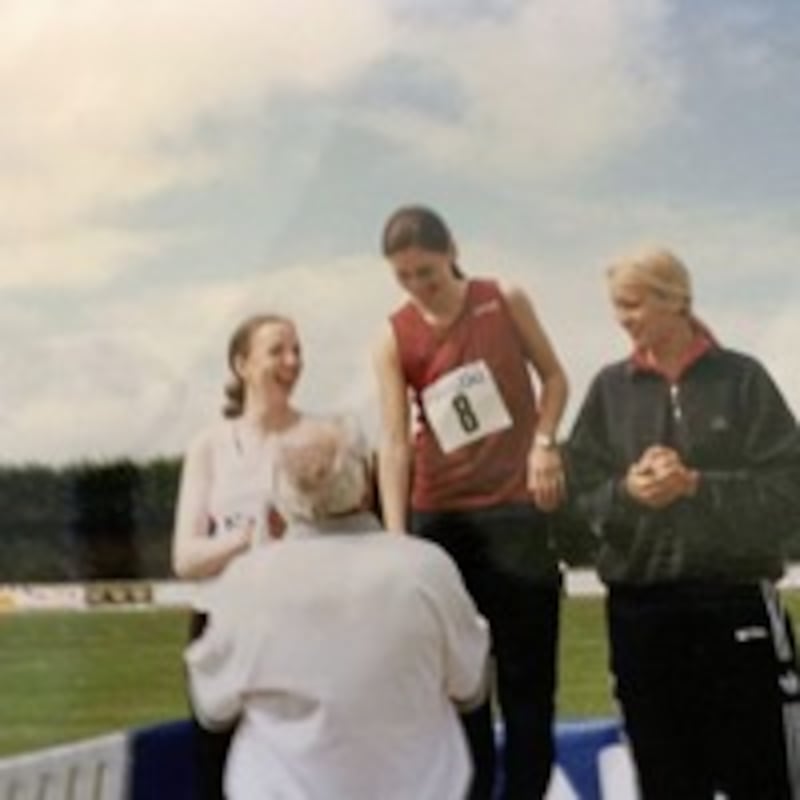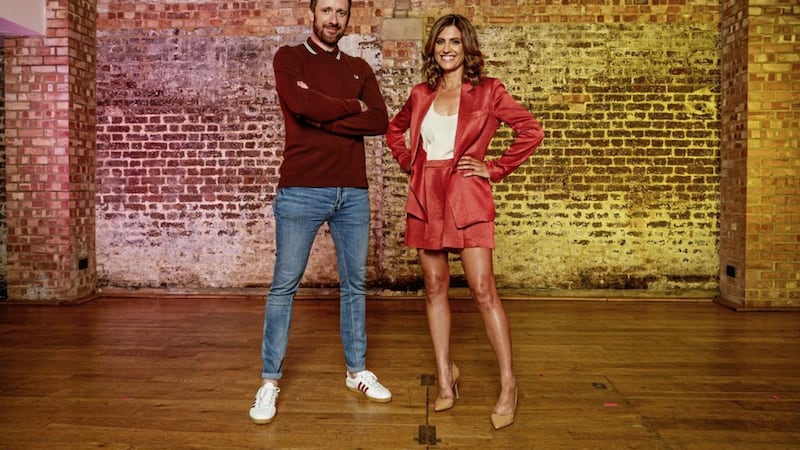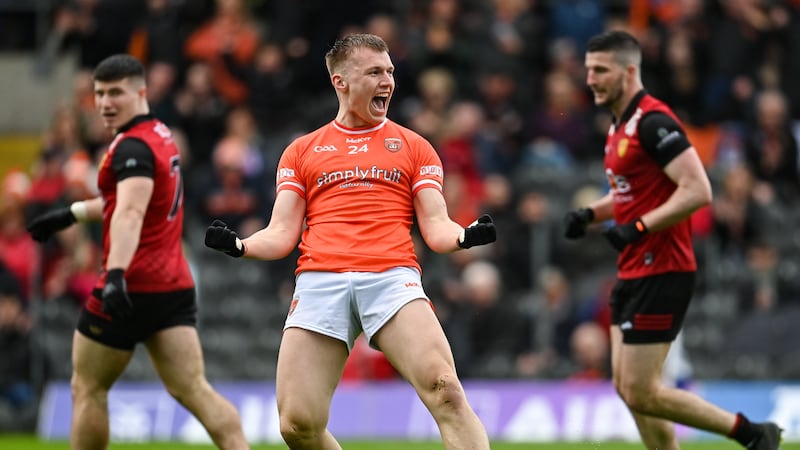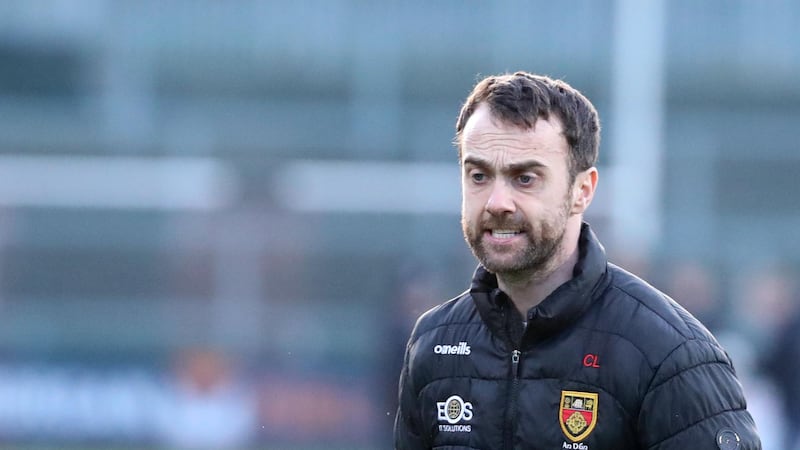IN the past, when it was said of a female athlete that she was ‘the daughter of a footballer’ few would have posed the question: ‘And did her father play any sport?’
Times have moved on, thankfully, and there’s no doubt that if either or both of the Chennaoui children make it in sport, it’ll be much more due to mum Orla than dad Mourad.
Orla’s own sporting prowess owes much to her mum too – a McNicholl from Dungiven, although related to Glenullin and Derry hero Dermot.
The Herons “were a sporty family,” she recalls, “mum and dad were really into it when they were kids. I remember mum doing fun runs, always challenging herself.”
Coming from Draperstown, unsurprisingly they were “massive GAA fans. We’d pile into the car every Sunday, head off to a football match, picnic by the side of the road – sport was a big part of family life.
“Big Derry fans, Ballinascreen as well, but those were the glory days of Derry, all very exciting building up to ’93.”
Derry’s All-Ireland Senior Football Championship triumph that year wasn’t against all odds, but it wasn’t something the young Herons had been taught to anticipate:
“We were there [the final at Croke Park] – it was amazing. Whenever dad went to matches he’d always tried to temper our expectations on the way: ‘Wave those flags out the window on the way because you won’t be able to wave them on the way home’, building us up to be defeated.
“I remember coming back from Croke Park that day – oh, it was incredible! All the parades and everything afterwards, the team going around in open top buses to all the different townlands. It was a brilliant, brilliant time.”
She played Gaelic games, but went down a different sporting route: “I dabbled with camogie but it’s such a brutal sport, I was too chicken for it really. Loved football but it only came when I was around 15, a bit late.
“My main sport was athletics, track and field, at the Ballinascreen Athletics club, down at the primary school, Dickie Edwards and Gene Devlin ran it. Quite a number of decent athletes, All-Ireland champions came out of it. That was my main thing from primary school to university.”
You almost have to drag it out of her, but Orla Heron was very talented herself – indeed she became an All-Ireland schools triple jump champion. Twice.
“There was a lot of training but that’s what I loved, the discipline of it. As a journalist that’s what I love from the outside, athletes trying to be the best that they can be.
“As a kid it wasn’t even so much about winning anything as trying to be better than I’d done before. I was a hurdler to begin with, which was always about trying to perfect the technique, whereas triple jump is about trying to get further. That fascination I have with seeing how far you can push something.

“At secondary school I was training three, four days a week at the athletics, and doing other sports as well, like gymnastics and different bits and pieces.
“There were residentials with the Northern Ireland coach, my mum taking me up to Belfast. I was mad into it. I downplay it now because it’s not where my life took me.
“I remember my granddad saying ‘Oh, when you make it to the Olympics I’m going to be your agent’. That was my dream, to represent my country. I thought if I could spend my life training, trying to be a better athlete, that would be an amazing thing to do.”
Going to university at Queen’s, Belfast, to study Law and French, she didn’t pursue athletics, admitting she didn’t have the complete focus required:
“When I look back now, having met athletes who made it, there is a definite difference in mentality from me. I wanted to work as hard as I possibly could and see how far it could take me – but those who have made it, there was no option of it them not taking them there. It becomes their everything, it’s all-consuming.
“I probably didn’t dare to dream that it would happen. That’s where visibility in sport and role models are really important. If you see people going before you, doing something, then it can become a reality.
“I almost didn’t want to say that was my ambition because it felt too grand - so at the back of your mind maybe you don’t commit as hard as you would do if you fully believed you could do it.
“I’m such a believer in the power of belief and how self-fulfilling that can be. With teams, if you come from somewhere which has a strong history, tradition, you see winning in that sport as being entirely possible – and that’s half the battle.”
Her choices then have strongly influenced her life ever since: “Alongside the sporting side I always thought I’d love to be a journalist. I kind of thought ‘sports journalist’, but initially it was ‘war correspondent’. There were a few journalism degrees but a more typical way was to get a grounding in something, a solid foundation, and then move on from that.
“My dad suggested law and I thought ‘Well, I like a good argument, I’ll probably be all right at that’,” she laughs. I loved French, loved chatting and meeting people, so another language means I can chat to more people. The degree took me to France for a year, which sounded very exotic at the time: ‘I’m doing that’.”
Fate also intervened: “I met Mourad there, in the same halls of residence, we got together in the final week over there. It shouldn’t have happened really, we were due to go our separate ways.
“That time in France was a huge influence also in terms of opening my mind to other languages and cultures, seeing how different people do things in different places.
“One extra language opened up a whole new world because you become more receptive to other languages and other people. That’s really important, it’s something I’m really grateful for.”
Now living in Amsterdam, where Mourad is a university scientist, she’s added Dutch to her repertoire, although she claims: “It’s better with five-year-olds than it is with adults, I’m really good at suggesting games to play, making sure everyone has been to the toilet – not quite there with political debate with other adults.”
After Queen’s, she went to Napier University in Edinburgh to do a journalism post-grad.
“I had a feeling that I wanted to do broadcast, but again it wasn’t something I wanted to shout about, it felt a bit grand. I also loved writing, I was an insatiable reader as a kid, always had a book in front of my nose.
“I gave print a go, at a weekly, but the pace didn’t really suit my energy at the time. I found I much preferred immediate deadlines, wanted to be a bit more scared. If you’ve a deadline hanging over you it’s quite terrifying – but it’s also thrilling.”
She did move on, into radio in Reading, then TV, first with Meridian in southern England then Scotland Today.
That limiting concept of some things being ‘a bit grand’ wasn’t due to her gender, but her sense of place, she feels:
“It wasn’t so much the female thing, I was not even aware of that until I got stuck into my career.
“The brilliant thing about being a young girl is you don’t realise the world is skewed against you until you come up against it. You live a lot of your life in bliss until it hits you - and then it’s a total shock.
“It was more the visibility aspect. I remember being in absolute awe of Seamus Heaney, that he could be such an amazing, wonderful writer and to have his level of renown, to be so celebrated across the world.
“I found it incredible that somebody from our area could do something like that. He was the closest I could see to what I wanted to do. I didn’t know that there were options like that open to someone like me.
“You move to Belfast for university and your horizons become a bit broader, but then you move beyond that and think ‘I’m just a little girl from a little village in Ireland, so I’m not big enough or important enough to express my opinion in print or hold a live broadcast like these people from England, or an Oxbridge background’. It took me a long time to realise that I was as good as everyone else – but I think that’s probably quite common…
“That took a long time but it’s not a bad thing, it’s a very good thing. I’m glad I didn’t jump straight into television. I remember working at STV, presenting the lunchtime news – and to get to that stage I’d done weekly newspapers, local radio – for free – then local radio down in England, for peanuts, then a TV station, and then come to STV and worked from newsroom journalist to newsroom journalist and presenter.
“This girl came in on work experience, because her dad had connections in the newsroom. I remember being blown away by her confidence, she was about five years younger than me.
“I asked her what she wanted to do and she said ‘I want to have my own TV show – but, looking around here, I could settle for something like this to start out with’.
“I thought, ‘Wow, we are coming at this from very different positions’. I was on the ladder, had worked so hard to get there, and she thought it was a step down from her ambitions. I haven’t heard of the poor girl since, I don’t know what happened to her TV show…”
Orla Chennaoui became Sky News NI correspondent in 2005, but that brought more terror than thrill at first, as she recalls with a shudder:
“Oh my God, daunting isn’t the word – it was absolutely terrifying. Terrifying.
“My first assignment was George Best’s funeral, so there was no way of easing into the role with a report on water rates. They had flown the whole top crew over from London. I met Kay Burley in our hotel reception, Eamonn Holmes came over, they’d sent over the whole works.
“I was down by the Best family home, had my producer with me, and I was broadcasting live as his coffin was being taken out, with mourners five, six deep.
“Sky’s way of doing live TV is to keep going, keep telling the story, and I’d no experience of that. I’d been there since half four in the morning, broadcasting from six. After about four hours we were told ‘There’s a helicopter in the air now, we’ll take it from here’.
“I was just so relieved. We moved back and mourners moved into our spot – and then got a call, ‘Actually we want one more live pic, is that OK?’
“Because I was so green I didn’t say think to say ‘No’ and explain why. I was too nervous to push forward, too nervous to tell my senior producer we couldn’t see anything.
“My producer Victoria climbed halfway up a lamp-post and we quickly developed a sign language so she would gesture when the coffin was going on the trestle, lifted, onto the hearse and so on.
“Unfortunately she went a bit early, and I was saying ‘The coffin is going on the trestle’ and everyone at home could see that it wasn’t…”
Embarrassment was one thing, but constantly dealing with the dark side of life was a factor in her switch to sport:
“I still thought I wanted to be a conflict correspondent, and have a foreign posting, but the reality of getting there is having to cover a lot of horrible stories – and they’re real.
“I’m an upbeat person, I like to look at what’s inspiring in life.”
She became Sky Sports’ principal Olympics correspondent, which is where her love of cycling began:
“After Beijing [2008 Olympics] cycling was big so I decided to concentrate on that first, I was planning to work through various sports. Athletics, tick; Boxing, well, I’ll come back to that; Cycling…
“That was just before Team Sky came on board, so I got swept along to Tour de France and so on and I just fell in the love with cycling, was completely hooked. I still look after Olympic sports but cycling is my main focus.”
Having transferred to Eurosport last year, leading its coverage of cycling, she leaps to the sport’s defence when asked about its standing now:
“People looking from the outside may decry this as being hopelessly naïve, but from close up it’s a different sport to what it was in ‘the Armstrong years’, for sure. It is a lot cleaner, partly because they had to wash their dirty linen in public, they had nowhere to hide.
“The testing done within cycling blows every other sport out of the water…The winner of the Tour de France, whoever’s in the yellow jersey, is tested at least once a day, often twice.
“Fans of other sports possibly don’t realise how little testing is done in their sport. We’re all hopelessly naïve if we think that sport as a whole is clean.
“There are many sports which make so much money that they cannot afford to wash their dirty linen in public the way cycling had to.
She hesitates when asked about her personal hopes for, the future, at pains not to seem self-satisfied: she’s simply content:
“I’d sort of planned to be at the stage where I’m at right now. I’m really happy with where I am, that I get to cover Olympic sports, cover cycling, I’ve got my podcast [‘When Orla Met..’], I write. I’d like to be involved more in campaigning for women’s sport, kids’ sport, safe sport, but I want to keep doing more of the same, bigger and better.
“I’d like to be able to use whatever platform I have to encourage people to make sports part of their lives, especially with kids. I probably will bore my kids to tears because I’m always using sporting analogies as life lessons.
“My daughter got cross because she lost a quiz with her friends: I told her about Mark Cavendish, the greatest sprinter in the Tour de France, who’s lost more than he’s won. I showed her a picture of him really angry and another of him really happy and that was enough for her.
“I’d love to be able to spread the word, for women especially to incorporate sport more into their lives, it not be a case of ‘you’re sporty’ or you’re not, just be active and embrace the joy that moving your body can bring.
“I’ve no idea what will come up next, but I just want to use my voice to add a positive message about sport and make it a bigger focus of people’s lives.”




